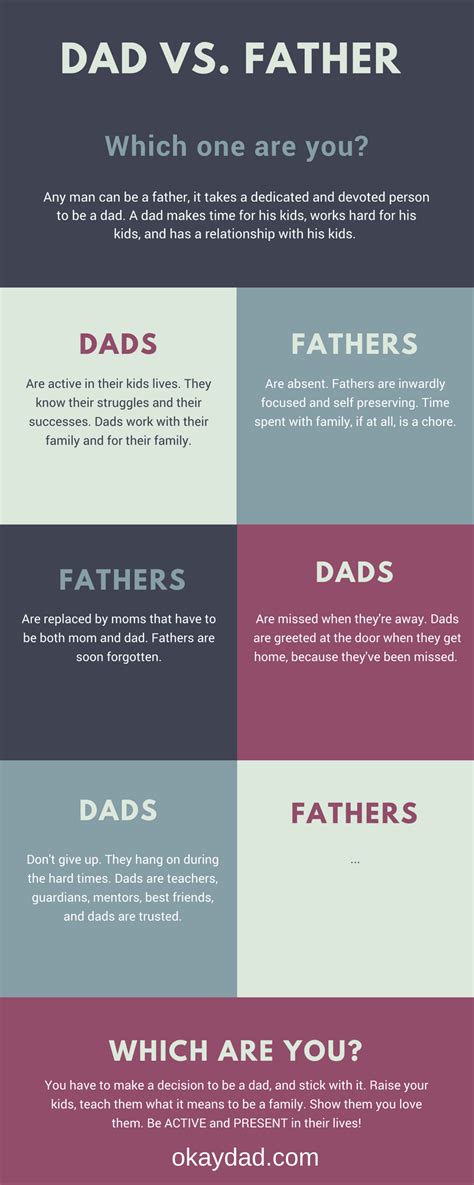Introduction

The terms “dad” and “father” are often used interchangeably, but there is a subtle yet significant difference between them. A father is a biological or adoptive parent of a child, while a dad is a father who is actively involved in raising and caring for his children. This article explores the distinction between these two roles, highlighting the benefits of being a dad and providing practical advice on how to become a more engaged father.
The Role of a Father
The role of a father is primarily defined by his biological or legal relationship to his children. Fathers are responsible for providing financial support, shelter, and basic care for their children. They also play an important role in shaping their children’s development through discipline, guidance, and emotional support. According to the National Survey of Children’s Health, fathers spend an average of 9.2 hours per week providing care for their children.
The Role of a Dad
In addition to the responsibilities of a father, a dad is a parent who takes an active and nurturing role in his children’s lives. Dads are emotionally involved in their children’s development, they are supportive and encouraging, and they spend quality time with their children. A study by the University of Melbourne found that children with involved fathers have higher levels of self-esteem, better academic performance, and decreased risk of behavioral problems.
Benefits of Being a Dad
There are numerous benefits to being a dad, both for the father and for the child. For the father, it can provide a sense of purpose and fulfillment, strengthen his bond with his children, and enhance his overall well-being. For the child, it can lead to improved physical and emotional health, increased academic achievement, and reduced risk of delinquency.
How to Become a More Engaged Father
Becoming a more engaged father requires time, effort, and a willingness to be present in your children’s lives. Here are some strategies that can help:
- Make time for your children: Set aside specific times each day or week to spend quality time with your children.
- Be present when you’re with your children: Put away your phone, turn off the TV, and focus on interacting with your children.
- Listen to your children: Show interest in what your children have to say, both big and small.
- Support your children’s interests: Encourage your children to pursue their passions and provide them with the resources they need to succeed.
- Be a role model: Children learn by watching the adults in their lives. Set a positive example by being kind, responsible, and respectful.
Common Mistakes to Avoid
There are several common mistakes that fathers make that can hinder their ability to be engaged parents. These include:
- Being too busy: While work and other responsibilities are important, it’s crucial to find a balance that allows for quality time with your children.
- Being too strict: Discipline is important, but it should be balanced with love and support. Avoid using harsh punishment or criticism.
- Being too distant: Fathers who are physically or emotionally distant from their children may miss out on important moments in their lives.
- Not asking for help: Fatherhood can be challenging at times. Don’t hesitate to ask for help from family, friends, or a therapist if you need it.
Conclusion
The difference between a dad and a father is not merely a matter of semantics. It is a fundamental distinction that reflects the level of involvement and commitment that a father has in his children’s lives. By embracing the role of a dad, fathers can make a profound difference in the lives of their children and create a lasting legacy of love and support.
